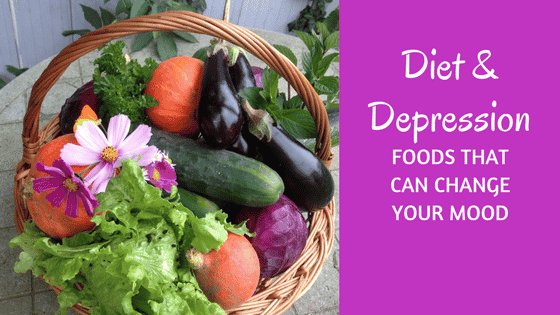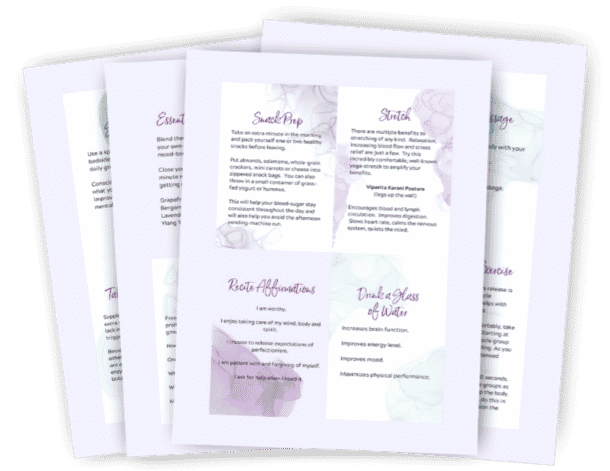Diet and Depression
It is possible for us eat drink and, literally, be merry? It may depend on what we eat and drink.
I’ve lived with depression for many years. As I slow down and pay attention to my body, I realize there are many factors that contribute to my mood: the weather, how much sleep I get, what I eat, whether I exercise, and how I spend my time. I have some control over these factors, so I can make choices that can help me feel better, at least some of the time.
Research looking at diet shows that people consuming a traditional diet, which focuses on whole foods, including lots of vegetables, and is rich in fermented foods, have significantly lower levels of depression and anxiety (25-30%) then those who consume a Westernized diet, which is usually higher in fat, sugar, and processed foods.
Understanding how our bodies work, helps us to see there are many physical imbalances in play for those with mood disorders. People who suffer from depression tend to have chronic, low-grade inflammation, more oxidative stress and blood sugar issues.
They also have gut dysbiosis which results in the production of a toxin known as LPS (lipopolysaccharide), which produced by bad bacteria in the small intestine. In fact, LPS is directly linked to the production of inflammation and oxidative stress, two physical factors that have been linked to depression. LPS also has a negative effect on the central nervous system, which plays a role in regulating mood and depression.
How do traditional diets help regulate these body processes and help mental health?
There are two ways traditional diets help support mental health:
Traditional diets are loaded with whole foods that contain phytonutrients which help lower inflammation and contain plenty of antioxidants which can protect against oxidative stress. Many whole foods are also prebiotic and help feed our good bacteria. (Read more about how gut bacteria and mood are related here.)
Traditional diets contain fermented foods which are high in lactobacillus and bifidobacterium. Studies of both probiotics and fermented foods show that these families of good bacteria can lower chronic inflammation, provide increased antioxidant protection and decrease levels of LPS.
LPS also can damage the intestinal wall lining and open up the gut. Good bacteria protects the gut wall lining and keeps the gut closed.
How can fermented foods help with depression and mental health?
When fibre found in wheat, rice and soy is fermented, it promotes better glucose levels and immune function and lowers inflammation. Fermentation of these foods as well as others such as lentils and buckwheat sprouts help the beneficial gut bacteria produce more GABA, a neurotransmitter known for reducing anxiety.
Fermented dairy products such as kefir and yogurt also help mood. One study of participants consuming fermented dairy, non-fermented dairy and no dairy, found that that those who consumed the fermented dairy had higher activity in their brains in the regions that controlled emotions and sensations.
It is believed that the reason for these changes is that fermenting of the milk bioactivates peptides and other chemicals that affects the central nervous system.
One human study using herbs in traditional cultures, compared fermented versions of the herbs with non-fermented. The fermented form lowered LPS and increased lactobacillus strains in the stool. Fermented herb products are now appearing in the health foods store but we can also add herbs when we make our own fermented foods such as sauerkraut, cultured vegetables and kimchi.
Lactobacillus strains produced from fermenting cabbage as in the case of kimchi and sauerkraut improves mental function.
There are plenty of fermented foods options and it is easy to create great recipes combining wholes foods, herbs and spices, fermented foods and wine – and consuming all of these on a regular basis can lift mood, improved mental health and overall health. It can be quite the adventure in food. So eat, drink and be merry.
Have you tried eating more fermented foods or supplementing with probiotics to help support your gut bacteria? Please share your experiences in the comments.
References:
Depression inhibits the anti-inflammatory effects of leisure time physical activity and light to moderate alcohol consumption. Suarez EC, Schramm-Sapyta NL, Vann Hawkins T, Erkanli A. Brain Behav Immun. 2013;32:144–152
Selective increases of bifidobacteria in gut microflora improve high-fat-diet-induced diabetes in mice through a mechanism associated with endotoxaemia, Cani PD, Neyrinck AM, Fava F, Knauf C, Burcelin RG, Tuohy KM, Gibson GR, Delzenne NM.. Diabetologia. 2007;50:2374–2383. doi: 10.1007/s00125-007-0791-0
Assessment of psychotropic-like properties of a probiotic formulation (Lactobacillus helveticus R0052 and Bifidobacterium longum Messaoudi M, Lalonde R, Violle N, Javelot H, Desor D, Nejdi A, Bisson JF, Rougeot C, Pichelin M, Cazaubiel M, Cazaubiel JM. R0175) in rats and human subjects. Br J Nutr. 2011;105:755–764.
Beneficial psychological effects of a probiotic formulation (Lactobacillus helveticus R0052 and Bifidobacterium longum, Messaoudi M, Violle N, Bisson JF, Desor D, Javelot H, Rougeot C R0175) in healthy human volunteers. Gut Microbes. 2011;2:256–261. doi: 10.4161/gmic.2.4.16108. [PubMed] [Cross Ref]
Fermented foods, microbiota, and mental health: ancient practice meets nutritional psychiatry, Eva M Selhub et al, J Physiol Anthropol. 2014; 33(1): 2.
In vitro and in vivo protective effects of fermented preparations of dietary herbs against lipopolysaccharide insult. Bose S, Song MY, Nam JK, Lee MJ, Kim H. Food Chem. 2012;134:758–765
Mediterranean dietary pattern and depression: the PREDIMED randomized trial, Almudena Sánchez-Villegas12*, Miguel Angel Martínez-González13 et al, BMC Medicine 2013, 11:208
Gut microbiota: intestinal bacteria influence brain activity in healthy humans. Collins SM, Bercik P. Nat Rev Gastroenterol Hepatol. 2013;10:326–327.






